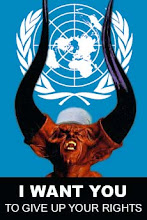| British Prime Minister Gordon Brown continues to focus on the New World Order as his U.S. tour comes to a close. In a speech at the John F. Kennedy Library in Boston, P.M. Brown speaks about steps international institutions create a NWO on the day when they came after the powder. Gordon Brown and his wife Sarah meet Ted Kennedy during their visit to the John F. Kennedy memorial library in Boston. Photograph: Adam Hunger/Reuters Europe and the US will face "terrifying risks" if they fail to join forces to fight global terrorism by combating poverty and disease, Gordon Brown warned yesterday in a speech on foreign policy in Boston. The prime minister voiced the hope that a "new dawn of collaborative action" would be ushered in next year with the election of a new US president. On the final leg of his three-day trip to the US, during which he met George Bush and the three presidential candidates, Brown said that American leadership would always be indispensable. But he made clear that he hopes for a more consensual style of US leadership when either Barack Obama, John McCain, or Hillary Clinton enters the White House next January. Brown indicated that this would allow Europe and the US to move on from the divisions over Iraq. In a speech at the John F Kennedy memorial library, Brown said: "Now is an opportunity for an historic effort in cooperation: a new dawn in collaborative action between America and Europe - a new commitment from Europe that I believe all European leaders can work with America to forge stronger transatlantic links. For I sense common ground between our two great continents in the urgent need for renewal and reform." Brown's speech was billed as his answer to Tony Blair's landmark 1999 Chicago speech, in which the then prime minister outlined his doctrine of liberal interventionism to justify the Nato bombing of Serbia and paved the way for the invasion of Iraq. Brown attempted to put the Blair doctrine on intervention behind him as he issued a plea for consensus. "Global problems require global solutions," he said. The prime minister invoked the memory of Kennedy as he warned of the risks of a return to a fractured transatlantic alliance. Standing next to the late president's younger brother, Senator Edward Kennedy, Brown said: "Today, as we face these new global challenges, the tantalising possibilities of a world where, as John F Kennedy put it, the strong are just, the weak secure and the peace preserved, are matched only by the terrifying risks of us failing to seize this moment." Brown's public burying of the Blair doctrine was accompanied by a revival of the second element of the 1999 speech - the need to reform the world's international and financial institutions to cope with a globalised world. Brown said that the UN, the International Monetary Fund and the World Bank, all created just before or after the second world war, were built for a bygone era. "For the first time in human history we have the opportunity to come together around a global covenant, to reframe the international architecture and build the truly global society." He would like to see the following reforms: · Expanding the permanent members of the UN security council members to include rising powers such as India. · Strengthening the World Bank's effort on poverty, but also changing some of its focus to deal with climate change by creating a global fund to finance low carbon investment. · Allowing the IMF to act with the same level of independence as a central bank. Brown also wants the IMF to focus on the surveillance of the global economic and financial system to prevent crises. Brown contrasted the era of Kennedy with today's world. "While in President Kennedy's time foreign relations were founded almost exclusively on the relative power of governments, today we must recognise the relevance to foreign policy of what we see before our eyes: that all over the world individuals are harnessing people power to transcend states - for good and sometimes for ill." Brown's speech was one of the final events of his tour. Downing Street hopes the visit will have laid the basis for a new era of relations with the next president while mending fences with Bush who was privately uneasy, though not surprised, when Brown cut troop levels in Iraq. Senator Kennedy showered Brown with praise. Recalling his brother's famous remarks in his 1961 inaugural address - "Ask not what your country can do for you, ask what you can do for your country" - he said: "Prime minister Brown has taken those words to heart." On his return home, Brown will endorse plans for a GI-style bill to help fund training for returning servicemen and women. =================================================== |
Monday, April 21, 2008
Subscribe to:
Post Comments (Atom)

















No comments:
Post a Comment